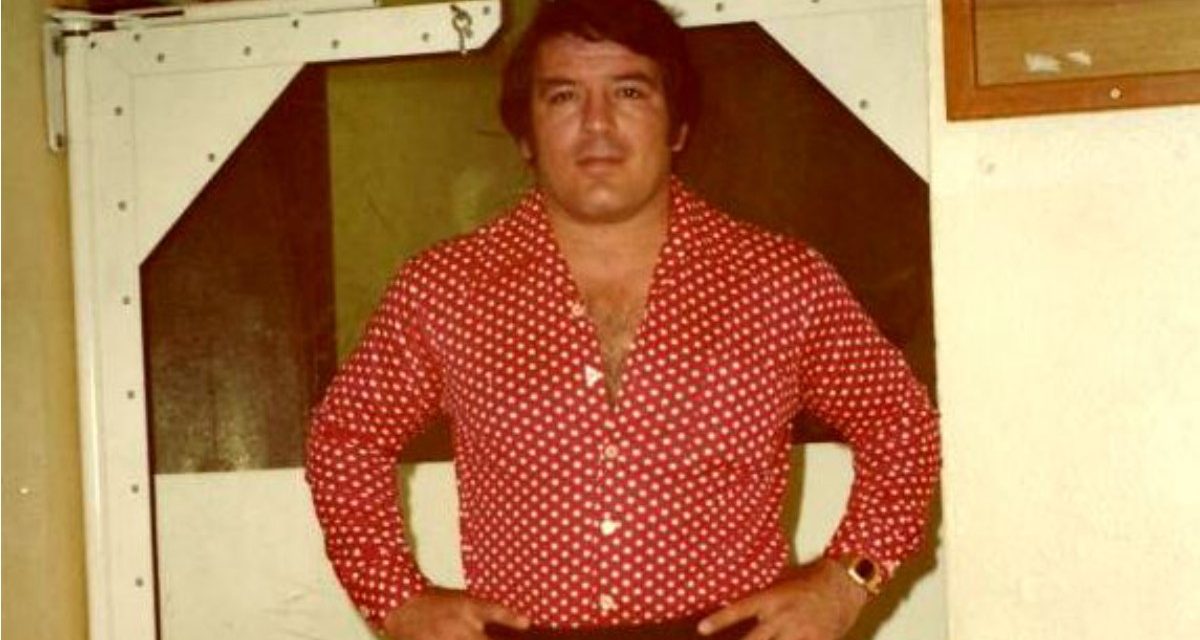In spring 1972, Jack Brisco invited Paul Jones to work in the Florida territory for promoter Eddie Graham after a long and successful stint as a tag team wrestler in the Mid-Atlantic. When Jones arrived in Tampa, he called Brisco and his brother Gerald from the airport and asked him for a lift. “Paul, you didn’t really believe me, did you?” Brisco quipped. “I was ribbing you. Eddie never said anything about you coming in.”
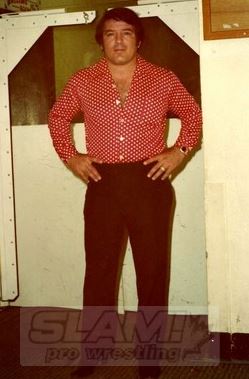
Paul Jones poses for a photo in Guelph, Ontario. Photo by Terry Dart.
Steaming mad, Jones was ready to hop on the next plane back to Charlotte, North Carolina, when the Briscos convinced him to see Graham anyway. Graham sized up Jones and asked him what he was doing in Florida. “I turned around and Jack and Gerald were laughing their asses off, then turn back around and Eddie was laughing his ass off too!” Jones told Florida wrestling guru Barry Rose. “I felt like a real big idiot then!”
It was all a big joke — and it was one of the few times anyone pulled anything over on Jones, who died on April 18, near Atlanta at age 75. “Jones was a great heel, arrogant and unbeatable,” Brisco wrote in his autobiography. In fact, he bet a case of Canadian Club whiskey that Jones would rake in more money as a villain than he ever did as a fan favorite in the Mid-Atlantic. “He took the bet and a year later he walked in the dressing room and handed me a case of Canadian Club. I should have wagered him more,” Brisco said.
Details of his death were forthcoming; his son Paul Eric Frederick, a longtime pilot, confirmed them to the wrestling community. The Mid-Atlantic Gateway website team of Dick Bourne and David Chappell was among those mourning his passing. “Paul was indeed a good friend to the Mid-Atlantic Gateway. He was one of the first guys in the business we interviewed for the site. George South first introduced us to him, and we just hit it off with him and we’ve remained friends with him ever since. He liked to rib us a little about being such marks for Mid-Atlantic Wrestling, but he knew we wore that like a badge of honor. He was one of our wrestling heroes growing up, so it was always a little surreal spending time with him. David was in touch with him via email almost every day. We’ll miss him very much.”
THE YOUNG BABYFACE
Born Alfred Frederick on June 16, 1942, Jones played football at Thomas Jefferson High School in Port Arthur, Texas, and boxed for several years in Golden Gloves competitions. He was working behind a camera at a TV station, shooting wrestling on Saturdays and helping to set up the studio ring, when announcer Paul Boesch suggested that give wrestling a try. He debuted in January 1964 and worked for most of the year in south Texas — Corpus Christi, Austin, and Galveston, among other spots — as a preliminary wrestler. Billed sometimes as a relative of old-time wrestler and promoter Paul Jones, he showed enough promise that promoter Leo Garibaldi called him “one of the bright young stars of the game.”
From December 1964 to March 1965, he was in Australia for promoters Jim Barnett and Johnny Doyle as Al Fredericks. From there, it was on to California against Cowboy Jack Lanza and then to the Pacific Northwest, where he started to make a name for himself as a small — 5-foot-11, 220 pounds — clean cut, good guy. He won an eight-man battle royal in Salem, Oregon, in October 1965 and started to get some title shots as promoter Don Owen tabbed him “the fastest rising young star in the Northwest.”
In March 1966, the 23-year-old captured his first singles titles by “Crusher” Stan Stasiak for the Northwest heavyweight title, using an airplane spin as his favorite move. Stasiak took the belt back in May, grabbing the ropes in Salem and upsetting Jones’ balance during an airplane spin. But Jones claimed the title again in December, beating Tony Borne in Roseburg, Oregon.
Jones headed back to Texas in July 1967, where he first faced a young Gerald Brisco, and also worked in Louisiana, where he and Gorgeous George Jr. had a long feud with the Assassins for the U.S. tag team championship.
In January 1968, Jones moved to the Carolinas for Jim Crockett, and he’d remain a fixture there for most of the next two decades. Crockett ran a tag team-based territory, and Jones immediately joined veteran Nelson Royal as one of the lead hero teams. They teamed to win the old Atlantic Coast tag title from Gene and Ole Anderson. “When I first came in here, Tex McKenzie had just left and Jim Crockett liked me because I was a young good-looking kid and everything,” Jones said. “He booked me and made me partners with Nelson Royal. Nelson and I did very well. We were partners for about four years. Never had one argument. Sweetheart of a guy.”
THE MOST DESPISED HEEL
Jones was ready for a change, though, in March 1972, when he took his nearly ill-fated plane trip to Florida. He had never heard anything but cheers, and he’d rarely been a singles competitor in Crockett country. “Jack wanted me to come down and work heel against him. Never worked heel in my life. He finally talked me into it and everything.” But Jones had enough of an ego to pull it off. He skyrocketed to the top of the promotion in a feud with Brisco and had the gall to heave the Florida championship belt into Tampa Bay, an angle that’s been duplicated to death since his July 1972 water toss.
In another show of arrogance, Jones set up a contest with the help of publicist Jerry Prater to decide the most popular and good-looking bachelor on the scene. He couldn’t help but win. He named his opponents as Aldo Bogni, Dusty Rhodes, Two Ton Harris, Redbeard, and Dory Funk Sr., some of the most grizzled and unattractive faces in the game. “Girls could write in and win this big life-sized poster of me. And I was real fit — that was my pride and joy. My god, what girl wouldn’t want this?” he laughed years later. “I milked that but all they did was put more arrogant heat on me. ‘That asshole, he ain’t nothing. He thinks he’s something.’ ”
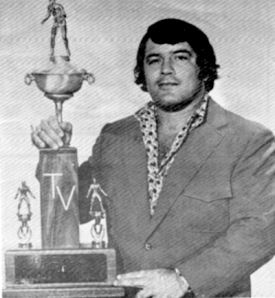
Paul Jones renaming the TV title after himself.
Yet Jones put on the white hat in 1973, when Brisco became NWA World champion, taking Florida’s top babyface out of the state and on the road. He had running feuds with the Great Mephisto, Johnny Valentine, and Buddy Colt. He ended up with three Florida heavyweight title reigns and two as state TV champion, including a hysterical angle where he re-inscribed the trophy as the Paul Jones Television Title and gave it to Brisco, who destroyed it on TV.
BACK TO THE CAROLINAS
After butting heads with booker Bill Watts, Jones headed back to the Carolinas as a top babyface, entering a long program with Johnny Valentine, who also had relocated from Florida. Their Christmas Day 1974 match sold out the Park Center and brought in $11,197, nearly double the biggest previous gate for the year. Jones said he loved working with Valentine because they both took it as a personal challenge to beat each other as hard as they could. Meeting in Atlanta, the Wrestling Fans International Association named Jones its “Wrestler of the Year” for 1974.
“Greg Valentine told me that his dad Johnny said out of his whole career, he enjoyed working with Paul Jones the most. I never went less than 45 minutes with him,” Jones said during one of several interviews with SLAM! Wrestling. “He used to knock the hell out of me and I would hit him back just as hard and he never complained and I never complained, but he liked it. The one thing I could day is no one could ever see daylight between our punches.”
Carolinas booker George Scott also hooked up Jones with Wahoo McDaniel, using Jones’ popularity to boost the big Indian, much as Nelson Royal’s fame rubbed off on Jones a few years earlier. Jones and McDaniel held the promotion’s world tag team championship in 1975. They were part of a famous “Ultimate Sacrifice” angle in which Ole Anderson rammed McDaniel’s head into his partner’s head, knocking them both out and setting up McDaniel for the pin. Jones professed years later not to know about the unusual match finish ahead of time, but said the program with the Anderson worked because it was just as violent as his feud with Valentine.
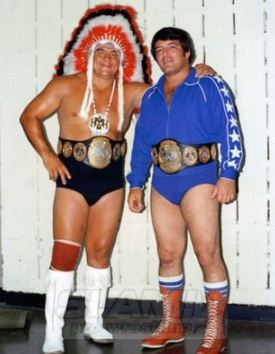
Wahoo McDaniel and Paul Jones.
“That’s why we drew so much money. People believed it and saw everything. We wrestled for months and months and months, long matches. We had a hell of a run and everything,” he said. Never one to mince words, Jones said he liked McDaniel personally, but had a difficult time working with him as a tag team partner. “In those two-hour matches, I swear to God, I’ve never said this before, but I’ll be honest with you: Wahoo was always fat and out of shape. I probably wrestled an hour and a half of that. Poor Wahoo, used to scare me to death because he used to do like he did playing football for the Jets, he used to take a ton of bennies, get fired up to keep going,” Jones said. “He was a hell of guy and everything. He was a hell of an athlete but he was a fat guy that got blowed up and everything else. Chop chop, tag out.”
With Ricky Steamboat, Jones earned Pro Wresting Illustrated Tag Team of the Year laurels in 1978, but he turned on his young ally, sucker punching him in a December 1978 battle royal after the duo engaged in a long struggle to regain the world tag team championship from Greg Valentine and Baron von Raschke. Jones then aligned with the Baron, who called him “just one of those guys that everybody liked. To me, he was just great. He had great timing, and I really had fun working with him. It was like a night off because he was where he was supposed to be, when he was supposed to be.”
Unsurprisingly, Jones later turned on the Baron. In all, Jones held half of the world tag title in the Mid-Atlantic six times. He claimed the Mid-Atlantic heavyweight title twice, trading it back and forth with old pal Jack Brisco, and had three runs with the U.S. heavyweight title.
“I got really creative when I turned heel,” Jones reflected. While he liked the rough give and take with Valentine and the Andersons, he said he adjusted his style during a years-long feud with Jimmy Valiant in the 1980s.
“To have long matches with Jimmy Valiant you’ve got to be creative, not so much long matches but leading the match and drawing money for that long of a period,” Jones said. “He listened good. He knew his limitations, but all during our matches and everything, every other word he said in the ring was ‘I love you brother, I love you brother.’ I don’t know anybody else who would have had the patience to work that program.”
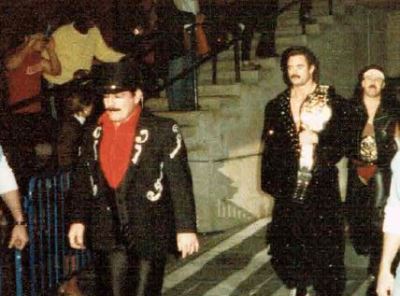
Paul Jones leads the NWA World tag team champions, Rick Rude and Manny Fernandez, to the ring at MoscaMania 2 in Hamilton, Ontario, on February 15, 1987. Photo by Greg Oliver
As Jones’ active career wore down, he managed a succession of challengers to Valiant, including Rick Rude and Manny Fernandez. The feud finally ended at Starrcade in November 1986 when Valiant beat Jones in a stipulation match and shaved his rival’s head in the ring. Still, Jones found it in his heart to induct Valiant into the Mid-Atlantic Hall of Heroes in 2016, an honor he himself received in 2008.
When Jim Crockett Promotions morphed into World Championship Wrestling and moved to Atlanta in 1989, Jones, Valiant, Ivan Koloff and other regulars stayed in North Carolina. Jones had a stake in South Atlantic Pro Wrestling and tagged with Chris Chavis (Tatanka) and McDaniel in 1991. He also wrestled on some independent cards in 1992 before calling it quits after a 28-year career. In retirement, he owned an auto body shop in Charlotte before relocating to Georgia.
“It changed after I got out — really, it snuck up on me because I was from the old school. The reason it snuck up on me was I didn’t want to accept it but I saw it — it was all marketing,” Jones said.
He voiced his feelings about the course of his profession at the 2004 Cauliflower Alley Club reunion in Las Vegas, criticizing WWE owner Vince McMahon for calling wrestling an exhibition. “We’ve all paid the same price, travelled the same roads, had the same roads, had the baloney blowouts and then got cheated on the payoffs,” Jones said.
Jones was a regular at promoter Greg Price’s fanfests in Charlotte in recent years, telling a dinner crowd at one point about his battle with prostate cancer. “I’m just Joe Blow and I enjoy it,” he said. “I’m just glad I had a career that my dream was big enough that I didn’t quit before I made it.”
RELATED LINK
